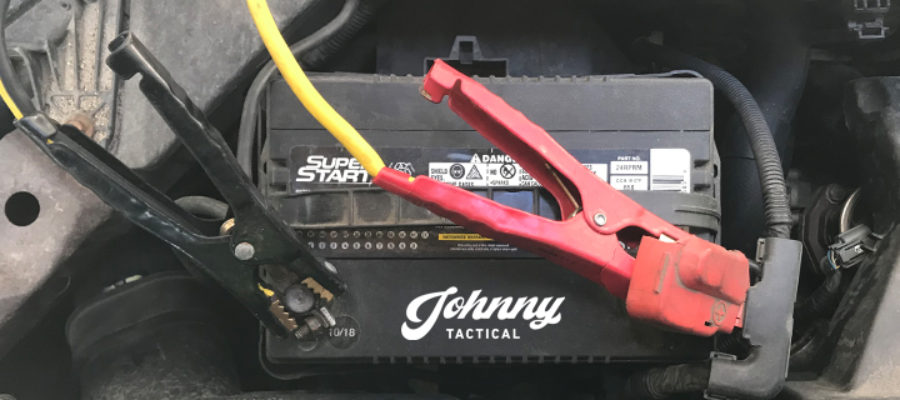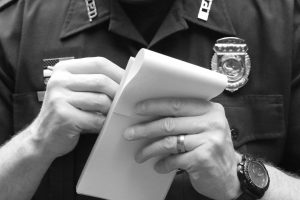SWAT training, circa 2006.
A coworker and I were away at SWAT training in another state. We made the hour-plus drive every morning for two weeks to become certified smooth operators. But we weren’t the only ones. We were just two dudes out of a large class coming from all over the northeast to sit at the feet of the LAPD SWAT instructors and learn the basics.
But, as per usual, there was more than tactics that I needed to learn.
SOPs
Much like your department, mine had a long list of Standard Operating Procedures. At the time we had recently become nationally accredited, which meant that we had spent lots of money on wining and dining resulting in more SOPs than you could shake a stick at. It also meant that we were getting beat over the head with them on a regular basis, because being accredited was a big deal apparently — at least to the administration.
One SOP in particular spelled out in great detail the way cruisers were to be cared for and maintained. One portion of the SOP prohibited using a cruiser to jump-start another vehicle due to all the electronics and whatnot wired into the cruiser’s battery and electrical system. It was verboten! And for some reason, that was one SOP that I remembered.
Black and White
As a personality type, I tend to be a rule-follower, generally speaking. In conjunction with that, as a young cop, I tended to see things in black and white. Learning to use discretion has been an evolutionary and gradual process for me. I learn better by doing, and consequently, by screwing up. Where this stage of my personal growth process and the department’s SOP met became yet another learning point.
At the end of a long day of training — the part of the day when everyone throws their gear into their cars like their hair is on fire and then leaves as fast as humanly possible — I was approached by a guy from another PD with a simple request. Something had happened, he had left his headlights on or something, and had a dead car battery. He had jumper cables in hand and needed a jump-start. Simple. How did I respond? Well, you guessed it, I told him we weren’t allowed to jump-start cars with our cruisers. Sorry, the SOP says that’s a no-no.
Problem Solved
He was good about it, said he understood, and went looking for anyone else that hadn’t flown out of there and had half a brain. I went off gathering my remaining gear and when I returned I found that my coworker had heard of this guy’s problem and without hesitation hooked our cruiser up to his, jump-started it, and had him on his way in a matter of minutes. And may I remind you that it was all done in direct violation of a department SOP. Gasp!
I was annoyed.
Guidelines
During our drive home, we had a little chat. My coworker, who was senior to me, explained that SOPs were only guidelines, and that it was more important to help someone than to adhere to the letter of an SOP that was only designed to protect the department — their equipment and their liability. Essentially, he said, people are more important than any SOP. And he was right.
As I look back on this part of my career, I still cringe. How was it that I was so wrapped up in doing the right thing by following the SOP that I didn’t actually do the right thing? I was more concerned with the rule itself than with helping someone and using my own judgement and discretion to do it, even if it meant technically breaking a rule. And I know for a fact that if our cruiser had spontaneously combusted during the jump-starting process, my coworker would have had no problem being like, Yup, the cruiser burned down. Why? We were helping someone. Ya, I know what the SOP says. It’s just a cruiser. Okay, where do I sign?
Discretion
Like I said, part of my problem was personality, the other part was my immaturity. I lacked the wisdom, the maturity, and the view of the bigger picture to know which rules to break, when to break them, and why. Using discretion is not only how we apply the law to the public, but also how treat our coworkers and fellow officers even within the confines of burdensome department policies and operating procedures.
Our only real authority comes from our discretion, and discretion comes from maturity and wisdom. No law or SOP can cover every circumstance, possible scenario, or factor — especially the human factor. That is why we — the individual officer — are so important and why who we are as people makes all the difference.
__________________________
– Do you see things as black and white?
– Are you a rule follower?
– When have you used your discretion to solve a problem?
– How did it work out?
– What could you have done differently?
__________________________
Thanks for reading! Do you have a story that you think we could learn from and that you’d like to share with Johnny Tactical nation? Fill out the contact form and include your name, rank, and department, or email it to [email protected] and follow these guidelines:
– It must be a firsthand account
– True
– Have a lesson, principle, or tactic to apply
– Cleaned of names, dates, and places
– Include your call sign
If your story is selected and published in our blog you’ll get the credit using your call sign and we’ll send you a free Johnny Tactical morale patch.





Leave a Reply
Your email is safe with us.
You must be logged in to post a comment.